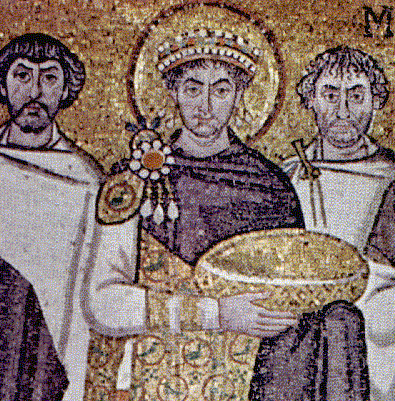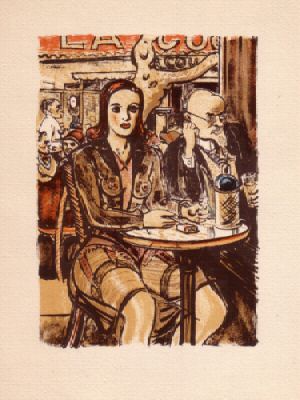Book burning
Watching and thinking about it (ah ha!) it seems that Truffaut's Fahrenheit 451 is to be the theme of the day. As the movie progresses a new theme surfaces: primativism.
As Montag's books burn, his superior talks about fire and it's primal allure. Who could explain it he asks? Of course a writer could and fire crops up as a metaphor for truth and knowledge from Plato to Melville and all points in between. The head fireman's inability ot grasp fire's allure is because he has neither truth nor knowledge. He cannot grasp the flame because he cannot order his thoughts in such a way as to imagine it and that is because he has no words. The primal force of fire is destructive, primative, ancient. This future utopia is built on the absence of printed material and thus the have rejected the means by which we conquer the fire, they have advanced all the way past modernity to prehistory--staring at paintings on the walls of their caves (e.g. TV).
And all those people at the end that have memorized their books and have become them? Well they are two things...two things that bring you away from the past and into the future, into the fire, and into civilization and yet are primative and ancient by their very nature as the first things. First, their memorized stories and their willing recitation and preservation makes them bards, the traveling oral historians and narrators that spread the earliest stories and arts, the auguries of society, art and learning like eagles apparant in the sky. The second thing they are, well, they are word incarnate aren't they? They are birth and resurrection and renewal of society, they are true messiahs, saviors through their sacrifice. Men and women who would learn books to save both those books and eventually the people that would burn them are truer saviors of this word than any man Pat Robertson or James Dobson may follow. The sound of their recitations fills the woods as the city sits silent. So it is the the woodland settlement is civilized, while the metropolis is a wilderness. The printed page fills up the whole world while mere words are nothing but wind without sound or moment: they are not true as the page.
It's the Stendhal and the Fury, the Proust and Prejudice, The Old Man and the Celine...these thigns are true and perforce good and alive though they are fiction and lies and dead withal. The fireman and his job, his house, and his laws are the trappings of civilization not it's heart or substance.
It's the embrace of primativism with the mere trappings of society overlaying it that is the hallmark of the barbaric life, the cruel life. The inhumanity of the world is in it's comforts largely because they are often substitutes for hard truths. The captain of the firemen mocks the fact that the books contradict each other; but that is the surest indication of their reliability. Only the primative mind finds simples things to be often correct.
As Montag's books burn, his superior talks about fire and it's primal allure. Who could explain it he asks? Of course a writer could and fire crops up as a metaphor for truth and knowledge from Plato to Melville and all points in between. The head fireman's inability ot grasp fire's allure is because he has neither truth nor knowledge. He cannot grasp the flame because he cannot order his thoughts in such a way as to imagine it and that is because he has no words. The primal force of fire is destructive, primative, ancient. This future utopia is built on the absence of printed material and thus the have rejected the means by which we conquer the fire, they have advanced all the way past modernity to prehistory--staring at paintings on the walls of their caves (e.g. TV).
And all those people at the end that have memorized their books and have become them? Well they are two things...two things that bring you away from the past and into the future, into the fire, and into civilization and yet are primative and ancient by their very nature as the first things. First, their memorized stories and their willing recitation and preservation makes them bards, the traveling oral historians and narrators that spread the earliest stories and arts, the auguries of society, art and learning like eagles apparant in the sky. The second thing they are, well, they are word incarnate aren't they? They are birth and resurrection and renewal of society, they are true messiahs, saviors through their sacrifice. Men and women who would learn books to save both those books and eventually the people that would burn them are truer saviors of this word than any man Pat Robertson or James Dobson may follow. The sound of their recitations fills the woods as the city sits silent. So it is the the woodland settlement is civilized, while the metropolis is a wilderness. The printed page fills up the whole world while mere words are nothing but wind without sound or moment: they are not true as the page.
It's the Stendhal and the Fury, the Proust and Prejudice, The Old Man and the Celine...these thigns are true and perforce good and alive though they are fiction and lies and dead withal. The fireman and his job, his house, and his laws are the trappings of civilization not it's heart or substance.
It's the embrace of primativism with the mere trappings of society overlaying it that is the hallmark of the barbaric life, the cruel life. The inhumanity of the world is in it's comforts largely because they are often substitutes for hard truths. The captain of the firemen mocks the fact that the books contradict each other; but that is the surest indication of their reliability. Only the primative mind finds simples things to be often correct.






0 Comments:
Post a Comment
<< Home